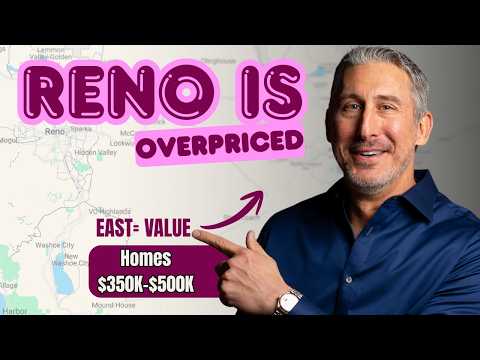View Quick Summary
Get the real story on Reno's housing market - not the media hype:
- Inventory is rising but still below pre-2020 normal levels
- No crash coming - expect 2-4% annual appreciation
- Sellers and buyers both confused about current market dynamics
- Professional negotiation skills matter more than ever
Let's address the elephant in the room. Everyone's asking the same question: Is the Reno housing market about to crash? With inventory rising and interest rates stubbornly high, the media would have you believe we're on the brink of disaster. But here's what's really happening in Northern Nevada's real estate market as we hit mid-2025.
The short answer? No crash is coming. What we're seeing is something far less dramatic but equally important to understand: a return to normalcy after five years of unprecedented market conditions.
The Inventory Reality Check
Yes, inventory is rising. We've gone from under 1,000 homes on the market to over 1,600. The media loves this statistic because "60% increase in inventory" makes for clickable headlines. But here's what they're not telling you: we're still below the inventory levels we had during the last normal years of 2017-2019.
Think about it this way. During those pre-COVID years, having 1,000-1,800 homes on the market was completely normal for our area. Then COVID hit, and inventory plummeted to historic lows. Some months we had fewer than 400 homes available. Now we're climbing back toward normal levels, and suddenly everyone's panicking.
It's like your friend who usually weighs 180 pounds dropping to 140 during an illness, then gaining back to 165. Are they gaining weight? Technically yes. Are they overweight? Not even close. That's exactly what's happening with our housing inventory.
The Great Market Confusion of 2025
Here's where things get interesting. For the first time in years, we have a genuinely confusing market. Sellers still think it's 2021, expecting bidding wars and offers over asking price. Buyers think it's 2008, expecting massive discounts and desperate sellers. Neither is right.
What we actually have is something many newer agents have never seen: a professional's market. This is a market where negotiation skills matter, where pricing strategy is critical, and where understanding true market value separates successful transactions from expired listings.
I recently had sellers shocked when a buyer offered $570,000 on their $600,000 listing. "Why are they lowballing us?" they asked. That's not a lowball that's negotiation. It's been so long since we've had a market where negotiation was even possible that both sides have forgotten how to play the game.
The Pricing Strategy That Actually Works
Let me share something crucial about today's market: pricing is everything. Not marketing, not staging, not professional photos pricing. Here's why.
When we determine your home is worth $600,000, you have three options:
Option 1: Price at market value ($600,000)
If you get a full-price offer that first weekend, will you feel like you left money on the table? Some sellers do, others celebrate the quick sale. Know yourself before choosing this strategy.
Option 2: Price slightly above ($620,000-625,000)
This gives negotiation room but risks missing buyers searching under $600,000. Worse, if you sit on market for 30-45 days then reduce to $600,000, buyers wonder what's wrong. You often end up accepting $570,000-580,000 less than you would have gotten initially.
Option 3: Price below market ($575,000-580,000)
This strategy hopes to generate multiple offers and bid the price up. It works in some markets and price points but can backfire spectacularly. I rarely recommend this unless you're truly motivated to sell quickly.
The data shows that homes priced correctly from day one sell faster and for more money than those requiring price reductions. It's counterintuitive but true.
What's Really Happening with Days on Market
Media outlets love reporting that homes are taking longer to sell. And technically, they're right. But context matters. During peak COVID market, homes sold in days, sometimes hours. Now the average is creeping back to 30-45 days exactly where it was during those normal years of 2017-2019.
This isn't a sign of market weakness. It's a sign of market health. Buyers have time to think, inspect, and negotiate. Sellers have time to properly market their homes. The frantic, fear-driven transactions of 2020-2022 weren't sustainable or healthy for anyone.
The Crystal Ball: Market Predictions Through 2026
Based on current data and trends, here's what I expect for the remainder of 2025 and into 2026:
Price Appreciation: 2-4% annually. We're back to normal, sustainable growth not the 20% spikes we saw during COVID. This is healthy appreciation that tracks with inflation and wage growth.
Interest Rates: Likely to remain in the 6-7% range through 2025. The magic number is 6%. If rates drop below that threshold, expect a surge of buyers entering the market. But don't hold your breath the Fed seems committed to keeping rates elevated to combat inflation.
Inventory: Will continue rising slowly but won't reach the levels needed for a true buyer's market. Too many homeowners are locked into 3-4% mortgages to sell unless they absolutely must.
Market Dynamics: The standoff between sellers and buyers will gradually resolve as both sides accept the new reality. Successful transactions will require skilled negotiation and realistic expectations from everyone involved.
The Hidden Factor: Rate-Locked Homeowners
Here's something the crash predictors aren't considering: the massive number of homeowners with mortgages under 4%. I refinanced at under 3% through pure luck of timing. Why would I sell and take on a 7% mortgage unless absolutely necessary?
Multiply my situation by thousands of Northern Nevada homeowners, and you understand why inventory won't flood the market. These rate-locked homeowners create an artificial supply constraint that will persist until rates drop significantly or life circumstances force sales.
If rates do drop below 6%, watch out. Not only will new buyers enter the market, but existing homeowners who've been waiting to move up or downsize will finally make their moves. This could create a surge in both supply and demand, likely favoring sellers once again.
The Long-Term Perspective That Matters
Let's zoom out for a moment. Over the last 30 years, Northern Nevada real estate has been one of the most consistent wealth-building tools available. Even accounting for the 2008 crash and recovery, long-term owners have seen tremendous appreciation.
Nothing in our market fundamentals suggests the next 30 years will be different. Population continues growing, California residents continue relocating here, major employers keep expanding, and land for new development remains limited. These factors support continued long-term appreciation.
Yes, renting might be cheaper than buying in the short term. Several viral videos make this point repeatedly. But they ignore rent increases, forced moves when landlords sell, and most importantly, the wealth-building power of homeownership. That "expensive" mortgage payment today will feel like a bargain in 10 years when rents have doubled but your payment remains the same.
The Bottom Line for Today's Market
We're not heading for a crash. We're experiencing a return to a normal, balanced market after years of unsustainable extremes. For buyers, this means more choices and negotiation power than you've had in years but not the massive discounts you might hope for. For sellers, this means pricing strategically and being willing to negotiate but still getting fair value for your property.
The key to success in this market? Work with experienced professionals who understand negotiation, pricing strategy, and market dynamics. The days of any agent being able to sell any house at any price are over. This is a professional's market, and professional guidance matters more than ever.
Stop waiting for a crash that isn't coming. Stop hoping for 3% interest rates that may never return. Today's market offers opportunities for both buyers and sellers who approach it with realistic expectations and solid strategies. The question isn't whether to act it's how to act intelligently in the market we actually have.
Frequently Asked Questions
Your Reno Real Estate Questions Answered
Cut through the media noise and get straight answers about Northern Nevada's housing market.

Need Help?
Navigate Reno's Changing Market with Expert Guidance
Get personalized insights on your specific situation. Whether buying or selling, we'll help you understand exactly where your opportunity lies. Free consultation: (775) 555-0123.


